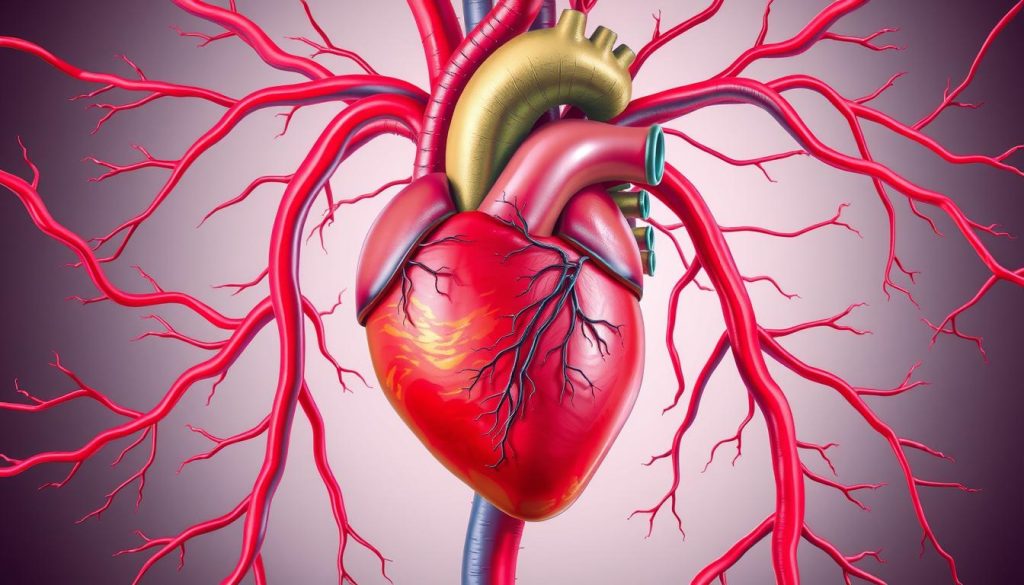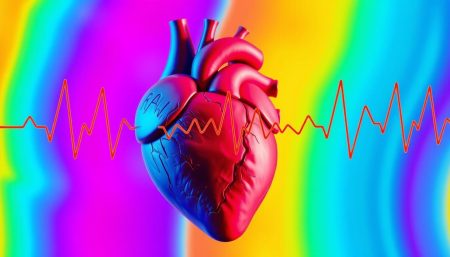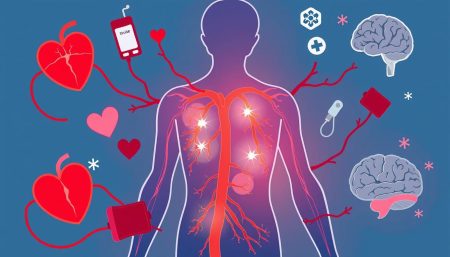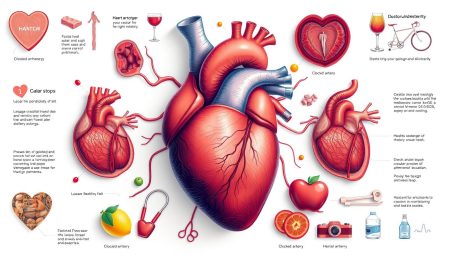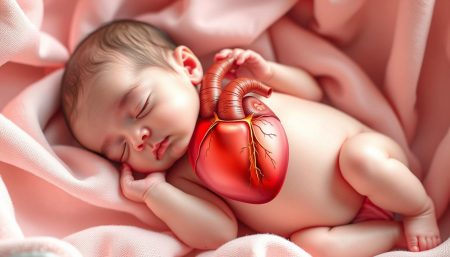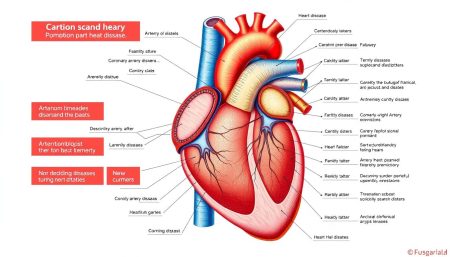Cardiovascular diseases affect millions worldwide. They harm the heart and blood vessels, leading to serious problems. Heart disease, stroke, and high blood pressure are common types.
The heart pumps blood all over our bodies. When it faces issues, our health can suffer. Cardiovascular diseases come in many forms, like clogged arteries and irregular heartbeats.
Knowing the signs of these diseases can save lives. Symptoms include chest pain, shortness of breath, and fatigue. High blood pressure, or “silent killer,” may not show symptoms at all.
Regular check-ups and a heart-healthy lifestyle are essential. They help keep your heart and blood vessels healthy.
Medical care for cardiovascular diseases has improved a lot. There are now more treatments, including innovative ones. By staying informed and proactive, we can lessen the impact of these diseases.
What Are Cardiovascular Diseases: A Comprehensive Overview
Cardiovascular diseases (CVDs) are a group of conditions that affect the heart and blood vessels. They are a major health threat worldwide, impacting millions every year.
Definition and Basic Understanding
CVDs involve problems with the heart and blood system. They can cause serious issues like heart attacks and strokes. This term includes many conditions, from atherosclerosis to congenital heart defects.
Impact on Global Health
CVDs are the top cause of death globally. They affect people of all ages and backgrounds. In the United States, heart disease is responsible for hundreds of thousands of deaths each year.
| Region | CVD Deaths (per 100,000) | Primary Risk Factors |
|---|---|---|
| North America | 143 | Obesity, Smoking |
| Europe | 152 | High Blood Pressure, Diet |
| Asia | 236 | Air Pollution, Sedentary Lifestyle |
Common Types of CVDs
Heart attacks happen when blood flow to the heart is blocked. This is often due to atherosclerosis, where plaque builds up in arteries. Congenital heart defects, present at birth, can also cause problems throughout life.
- Coronary artery disease
- Heart valve disorders
- Arrhythmias
- Heart failure
It’s important to understand these conditions to prevent and treat them early. Regular health check-ups and lifestyle changes can greatly reduce CVD risks.
Risk Factors Contributing to Heart Disease Development
Knowing the risk factors for heart disease is key to preventing it. These factors fall into three groups: things we can change, things we can’t, and lifestyle choices. By understanding these, we can lower our risk of heart problems.
Modifiable Risk Factors
There are many things we can control to improve our heart health. High blood pressure is a big cause of heart disease. We can manage it with medicine and lifestyle changes.
Unhealthy cholesterol levels and diabetes also harm the heart. Regular health checks and managing these conditions are vital.
Non-modifiable Risk Factors
Some risk factors we can’t change but are important to know. Age is a factor, with heart disease risk increasing as we age. Family history and genetics also play a role.
While we can’t change these, being aware helps us stay vigilant and take preventive steps.
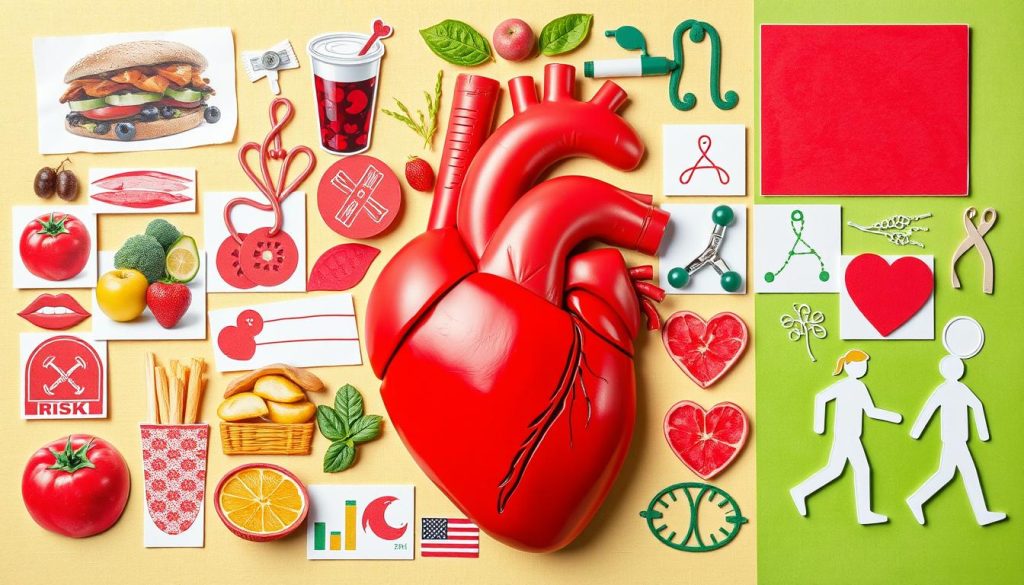
Lifestyle-Related Risks
Our daily choices greatly affect our heart health. Smoking harms blood vessels and speeds up plaque buildup in arteries. A sedentary lifestyle and bad diet lead to obesity, a major risk factor.
Drinking too much alcohol can also raise blood pressure and increase heart disease risk. Making better choices in these areas can greatly reduce our heart disease risk.
“Small lifestyle changes can make a big difference in heart health. Every step counts towards a healthier heart.”
By tackling modifiable risk factors and adopting heart-healthy habits, we can control our heart health. This reduces the chance of getting heart disease.
Common Symptoms and Warning Signs of Heart Problems
Knowing the signs of heart issues can save lives. Heart problems show up in different ways, from mild to severe pain. Spotting these signs early helps people get medical help fast, which can prevent serious heart problems.
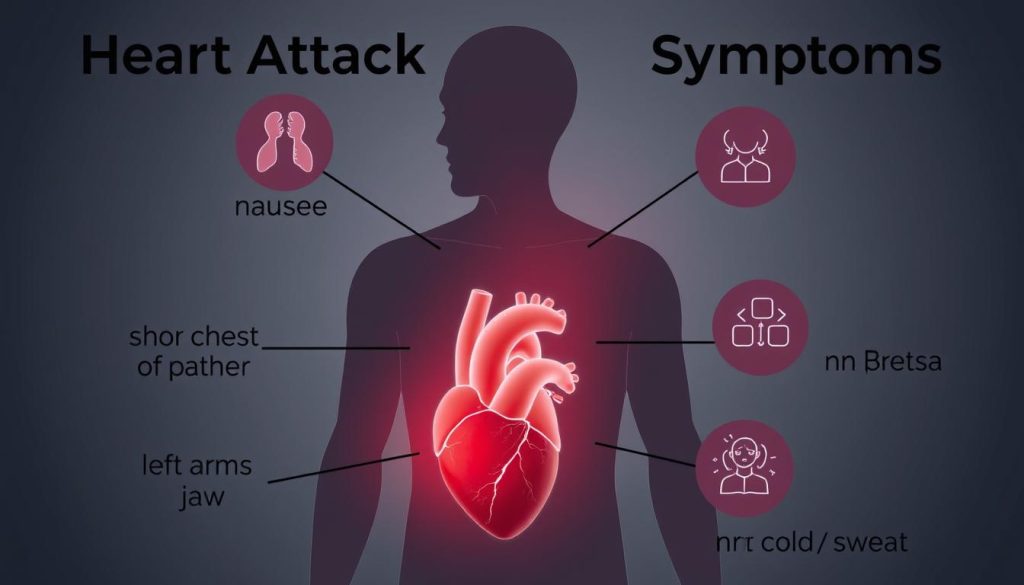
Heart attacks often cause chest pain or pressure, feeling like a heavy weight. This pain can move to the arms, jaw, or back. Other signs include shortness of breath, nausea, and cold sweats. Women might feel tired or dizzy instead.
Stroke symptoms come on suddenly. Look out for numbness or weakness on one side of the body, confusion, trouble speaking, and severe headaches. Vision problems and losing balance are also signs of a stroke.
Arrhythmia signs can be tricky to notice. Look for irregular heartbeats, palpitations, or a fluttering feeling in the chest. Some people feel lightheaded or get tired for no reason.
| Condition | Common Symptoms | Immediate Action |
|---|---|---|
| Heart Attack | Chest pain, shortness of breath, nausea | Call 911 immediately |
| Stroke | Sudden numbness, confusion, severe headache | Seek emergency care |
| Arrhythmia | Irregular heartbeat, dizziness, fatigue | Consult a doctor promptly |
Spotting these symptoms early can make a big difference. If you or someone near you shows these signs, get medical help right away. Quick action is key to managing heart problems well.
Understanding Atherosclerosis and Its Role in Heart Disease
Atherosclerosis is a major cause of heart disease and peripheral artery disease. It happens when fatty deposits build up in arteries, narrowing them. This restricts blood flow. Let’s look at how it develops and affects our heart health.
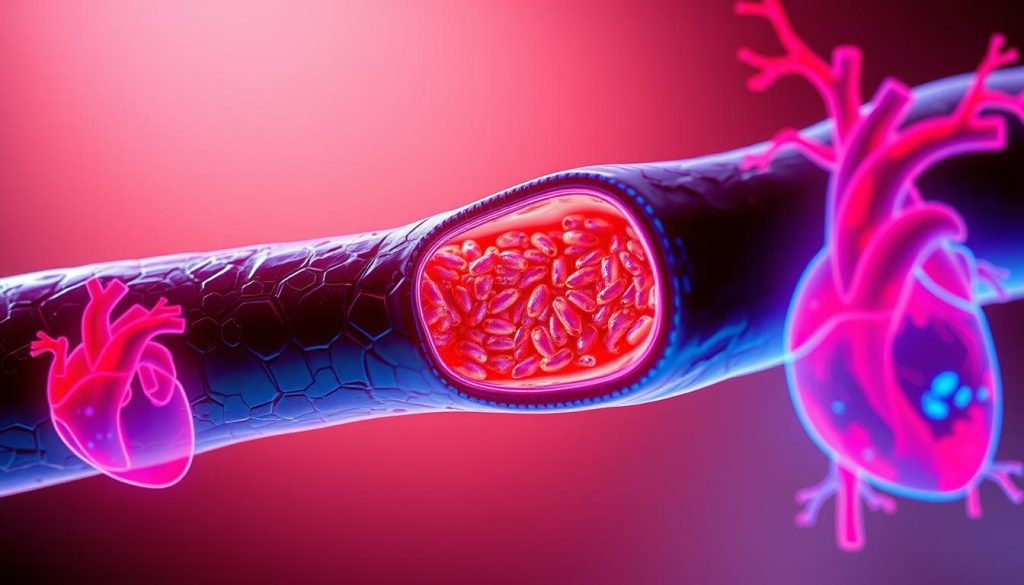
Formation of Plaque
Plaque starts when cholesterol and other substances gather in artery walls. Over time, these deposits harden and narrow the arteries. This reduces blood flow. It can affect arteries all over the body, including those to the heart and limbs.
Progression of Arterial Damage
As atherosclerosis gets worse, arteries become less flexible and more likely to block. This raises the risk of heart attacks and strokes. In peripheral artery disease, less blood flow to the limbs can cause pain and make walking hard.
Prevention Strategies
Preventing atherosclerosis is key for heart health. Making lifestyle changes can help a lot:
- Eat a heart-healthy diet rich in fruits, vegetables, and whole grains
- Exercise regularly to improve circulation and maintain a healthy weight
- Quit smoking to protect your arteries from damage
- Manage stress through relaxation techniques or meditation
- Control blood pressure and cholesterol levels with medication if necessary
By understanding atherosclerosis and taking preventive steps, we can lower our risk of heart disease and peripheral artery disease. Regular health check-ups can help monitor our heart health and catch problems early.
Different Types of Heart Attacks and Their Causes
Heart attacks can happen in many ways, each with its own causes and effects. Knowing about these can help prevent and catch them early.
The most common heart attack is the ST-elevation myocardial infarction (STEMI). It happens when a coronary artery is completely blocked. This stops blood from reaching part of the heart muscle. Atherosclerosis, or plaque buildup in arteries, often causes STEMI.
Non-ST-elevation myocardial infarction (NSTEMI) is another type. It occurs when an artery is only partially blocked. This reduces blood flow but doesn’t stop it completely. High blood pressure can damage artery walls, leading to NSTEMI.
A silent heart attack, or silent ischemia, can happen without any symptoms. People with diabetes or those who’ve had heart attacks before are more likely to get this type.
| Heart Attack Type | Main Cause | Risk Factors |
|---|---|---|
| STEMI | Complete artery blockage | Atherosclerosis, smoking |
| NSTEMI | Partial artery blockage | High blood pressure, obesity |
| Silent Heart Attack | Unnoticed blockage | Diabetes, previous heart attacks |
It’s important to know the signs of each heart attack type. If you feel chest pain, shortness of breath, or unexplained fatigue, get help right away.
Living with Arrhythmia and Heart Rhythm Disorders
Arrhythmias are irregular heartbeats that can affect people of all ages. These heart rhythm disorders range from harmless to life-threatening. Some arrhythmias are linked to heart failure or congenital heart defects. Understanding the types, treatments, and lifestyle changes can help manage these conditions effectively.
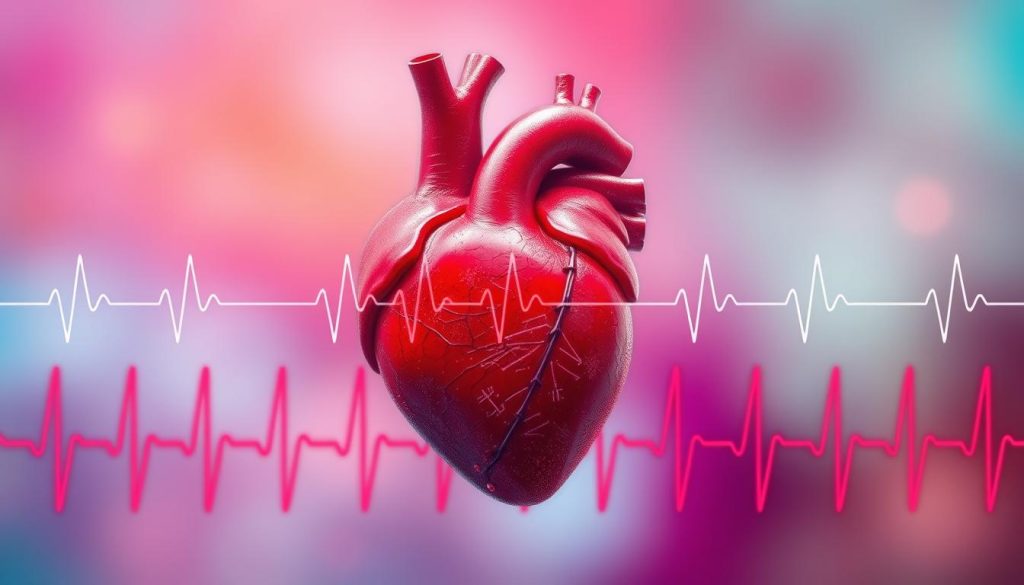
Types of Arrhythmias
Arrhythmias come in various forms, each affecting the heart’s rhythm differently:
- Tachycardia: Abnormally fast heartbeat
- Bradycardia: Abnormally slow heartbeat
- Atrial fibrillation: Irregular and rapid heart rate
- Ventricular fibrillation: Life-threatening arrhythmia
Treatment Options
Treatment for arrhythmias depends on the type and severity. Options include:
- Medications to control heart rate
- Cardioversion to reset heart rhythm
- Catheter ablation to destroy problematic heart tissue
- Implantable devices like pacemakers or defibrillators
Lifestyle Management
Managing arrhythmias often involves lifestyle changes:
- Reducing stress through relaxation techniques
- Maintaining a heart-healthy diet
- Regular exercise as approved by a doctor
- Avoiding triggers like caffeine or alcohol
People with arrhythmias, including those with heart failure or congenital heart defects, should work closely with their healthcare providers. A personalized management plan can help. With proper care and lifestyle adjustments, many can lead full, active lives despite their heart rhythm disorders.
Prevention Strategies and Lifestyle Modifications
Preventing heart disease, stroke, and high blood pressure is key to better health. Making smart choices every day can lower your risk of heart problems.
Dietary Guidelines
Eating right is vital to avoid heart diseases. Choose more fruits, veggies, whole grains, and lean proteins. Cut down on saturated fats, trans fats, and sodium. Here’s a quick guide for better eating:
| Food Group | Recommended Choices | Foods to Limit |
|---|---|---|
| Proteins | Fish, lean poultry, beans | Red meat, processed meats |
| Fats | Olive oil, avocados, nuts | Butter, coconut oil, lard |
| Carbohydrates | Whole grains, fruits, vegetables | White bread, sugary snacks |
Exercise Recommendations
Exercise is essential to prevent heart disease and stroke. Aim for 150 minutes of moderate exercise or 75 minutes of vigorous exercise weekly. Try brisk walking, swimming, or cycling.

Stress Management
Stress can raise blood pressure and heart risks. Use deep breathing, meditation, or yoga to reduce stress. Also, sleep well and stay connected with friends to keep stress low and heart healthy.
“The greatest weapon against stress is our ability to choose one thought over another.” – William James
By changing your lifestyle, you can control your heart health and lower disease risks.
Advanced Treatments and Medical Interventions
Medical science has made big steps in treating heart diseases. Doctors now have many new options for patients with heart attacks, heart failure, and peripheral artery disease.
For heart attack patients, fast action is key. Doctors use drugs to break up clots or perform angioplasty to open blocked arteries. In serious cases, bypass surgery may be needed to get blood flowing again.
Heart failure treatment has grown beyond just medicine. New devices like implantable cardioverter-defibrillators (ICDs) and ventricular assist devices (VADs) can greatly improve a patient’s life.
Peripheral artery disease treatments now include less invasive methods. Atherectomy, for example, uses small blades to remove plaque from arteries, helping blood flow to the limbs.
“The future of cardiovascular care lies in personalized medicine. We’re moving towards treatments tailored to each patient’s unique genetic makeup and risk factors.”
Stem cell therapy is showing promise for fixing damaged heart tissue. Though it’s experimental, it could change how we treat heart attacks and heart failure soon.
As research keeps going, new treatments appear. From gene editing to nanotechnology, cardiovascular medicine is on the verge of major breakthroughs. These could save many lives.
Recovery and Rehabilitation After Cardiovascular Events
Recovering from a heart attack, stroke, or heart failure takes time and effort. It starts when you’re stable, working to get stronger and avoid future problems.
Cardiac rehabilitation programs are key to getting better. They include:
- Supervised exercise routines
- Nutritional counseling
- Stress management techniques
- Medication management
Stroke survivors often need to relearn basic skills like walking or speaking. They might get help from physical, occupational, and speech therapy.
For those with heart failure, managing symptoms and improving life quality is the goal. This means watching fluid intake, eating low-sodium foods, and taking medicines as directed. Regular exercise is also important for heart health.
“Recovery is not just about healing the body, but also about rebuilding confidence and embracing a heart-healthy lifestyle.”
The time it takes to recover varies based on the event’s severity. Here’s a general guide:
| Event | Initial Recovery | Full Recovery |
|---|---|---|
| Heart Attack | 4-6 weeks | 3-6 months |
| Stroke | 3-4 months | 6 months – 2 years |
| Heart Failure | Ongoing management | Lifelong process |
Remember, recovery is unique to each person. With the right care, support, and lifestyle changes, many regain their health and energy after these events.
The Future of Cardiovascular Disease Management
The future of heart disease management is looking bright. Researchers are working on new technologies to prevent and treat heart disease. These innovations aim to change how we handle heart health, from finding problems early to creating treatments just for you.
New trends in heart disease management include genetic therapies and regenerative medicine. These new methods could fix congenital heart defects and mend damaged heart tissue. Artificial intelligence and machine learning are also helping predict heart disease risks and make prevention plans for each person.
The future of heart health care is all about precision medicine. This method uses a person’s genes, lifestyle, and surroundings to make treatments that fit them perfectly. For people with heart disease, this could mean better medicines with fewer side effects. It could also lead to new ways to handle complex heart problems like arrhythmias and heart failure.
As research keeps moving forward, we’ll see big improvements in life for those with heart diseases. We’ll have better imaging and surgeries that don’t hurt as much. The goal is to lessen the impact of heart disease worldwide and help patients live better lives.
FAQ
Q: What are cardiovascular diseases?
A: Cardiovascular diseases (CVDs) affect the heart and blood vessels. They include heart disease, stroke, and high blood pressure. These diseases are the leading cause of death worldwide, affecting millions.
Q: What are the main types of cardiovascular diseases?
A: Main types include heart disease, stroke, and high blood pressure. There’s also heart attacks, atherosclerosis, and heart failure. Each affects the heart and blood vessels differently, but all are serious.
Q: What are the risk factors for developing heart disease?
A: Risk factors include high blood pressure and high cholesterol. Smoking, obesity, and a bad diet also increase risk. Age, gender, and family history are non-modifiable factors.
Q: What are the common symptoms of a heart attack?
A: Symptoms include chest pain and shortness of breath. Pain in the arms, back, and jaw is also common. Nausea, lightheadedness, and cold sweats can occur too. Symptoms can vary, and some heart attacks are silent.
Q: How does atherosclerosis contribute to heart disease?
A: Atherosclerosis causes plaque buildup in arteries. This narrows them and reduces blood flow. It can lead to heart disease and heart attacks. Plaque buildup can also cause blood clots, blocking blood flow.
Q: What lifestyle changes can help prevent cardiovascular diseases?
A: To prevent CVDs, eat a healthy diet and exercise regularly. Quit smoking and manage stress. Limit alcohol and maintain a healthy weight. Regular health check-ups are also important.
Q: What is an arrhythmia?
A: An arrhythmia is an irregular heartbeat. It happens when the heart’s electrical impulses don’t work right. Some arrhythmias are harmless, but others can be dangerous and may need treatment.
Q: How is peripheral artery disease related to cardiovascular health?
A: PAD is a circulatory problem affecting the limbs, usually the legs. It’s caused by atherosclerosis, the same as heart disease. People with PAD are at higher risk for heart attacks and strokes.
Q: What advancements are being made in cardiovascular disease treatment?
A: Cardiovascular medicine is evolving fast. New treatments include minimally invasive surgery and better medications. Stent technologies and gene therapies are also advancing. Artificial intelligence and regenerative medicine are being explored for early detection and treatment.












